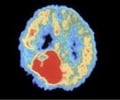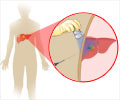
A research article to be published on July 21, 2010 in the World Journal of Gastroenterology addresses this question. This is the first study to report that galangin mediates apoptosis through a mitochondrial pathway.
Their data demonstrated that (1) galangin induces HCC cell apoptosis by triggering Bax translocation to the mitochondria; (2) galangin-treated HCC cells causes the release of AIF and cytochrome c into the cytosol from the mitochondria; and (3) overexpression of Bcl-2 attenuated galangin-induced HepG2 cells apoptosis, while down-regulated Bcl-2 expression enhanced galangin to induce cell apoptosis.
Understanding the mechanism by which galangin induces apoptosis may lead to its use as an anti-cancer treatment of HCC. This study may represent a future potential chemotherapeutic drug in the treatment of HCC with galangin.
Source-Eurekalert











